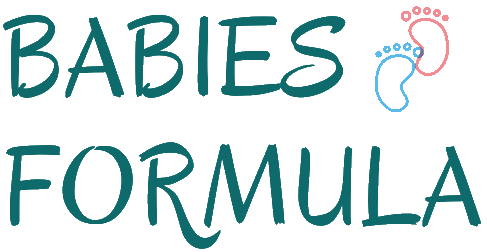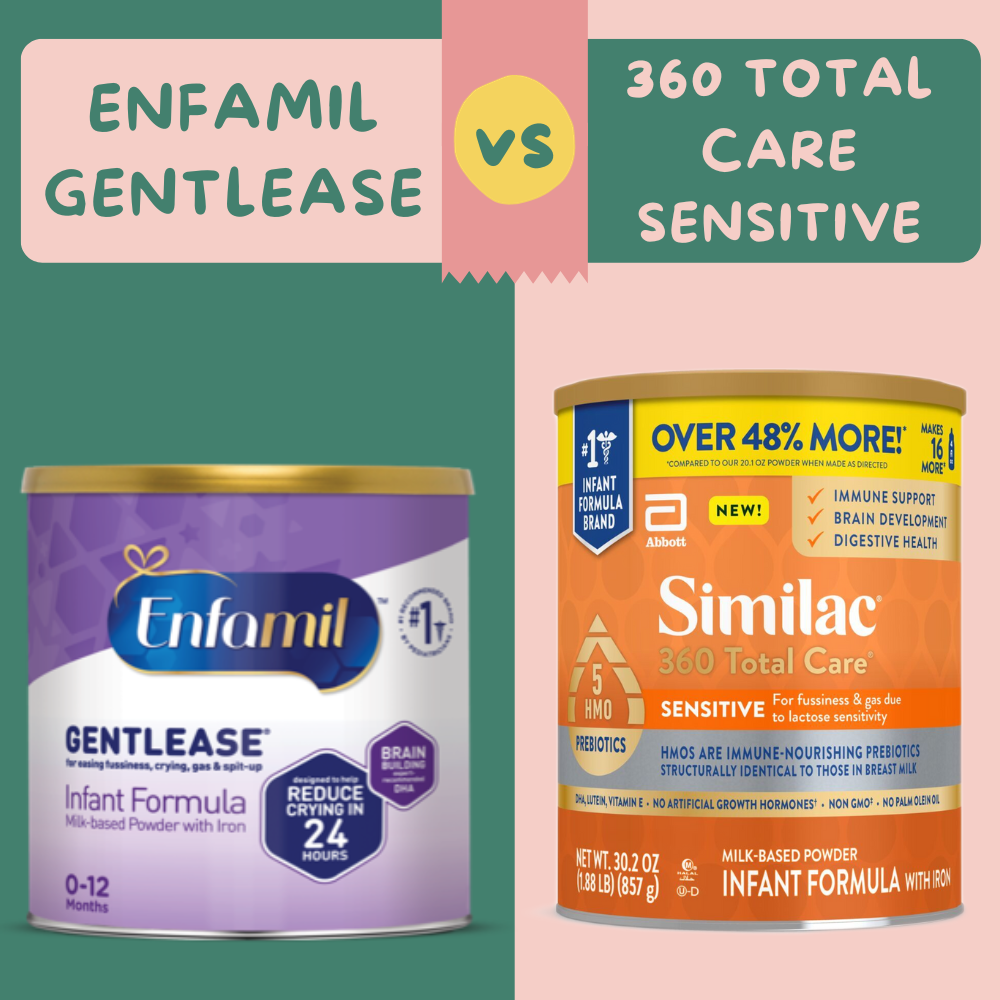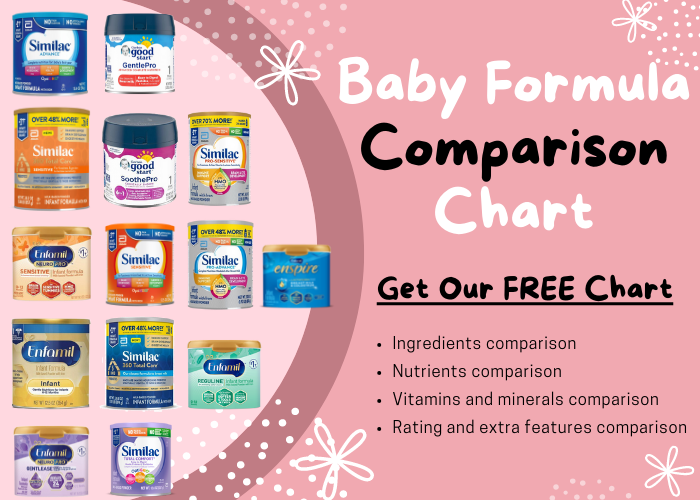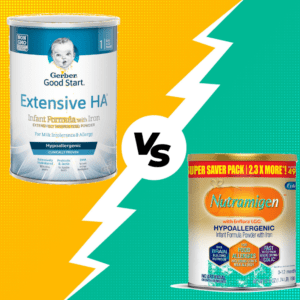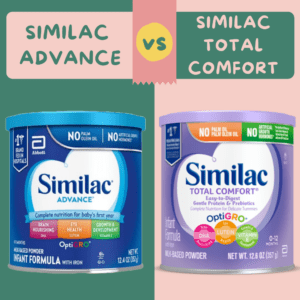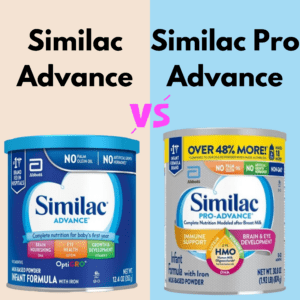What’s The Difference Between Gentlease and 360 Total Care Sensitive?
Enfamil Gentlease and Similac 360 Total Care Sensitive cater to lactose-sensitive infants by reducing lactose content. However, they diverge in their approach:
The Difference is that Enfamil Gentlease is partially hydrolyzed, lactose-reduced by 80%, and sugar-free whereas Similac 360 Total Care Sensitive is non-GMO, lactose-reduced by 98%, palm oil-free, and has 5 HMO prebiotics. The protein source in 360 Total Care Sensitive is milk protein isolate from skim milk powder, filtered to remove minerals and lactose.
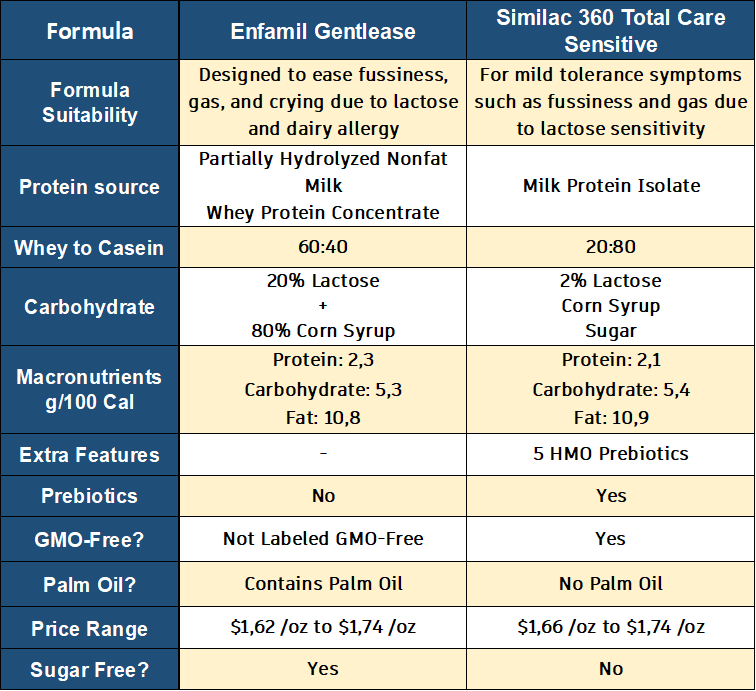
The Best One?
When choosing between Similac 360 Total Care Sensitive and Enfamil Gentlease, several factors come into play. Both formulas are designed to address digestive sensitivities in infants, but they have their own unique features:
Similac 360 Total Care Sensitive:
- This formula is formulated for mild to moderate lactose sensitivity. If your baby has issues related to lactose, this might be the preferred choice.
- Similac 360 Total Care Sensitive is non-GMO, which can be a significant factor for parents who prioritize avoiding genetically modified organisms.
- It’s palm oil-free, which is beneficial for parents who prefer formulas without palm oil due to concerns about its impact on nutrient absorption.
- The formula includes 5 HMO (Human Milk Oligosaccharides) prebiotics, which are beneficial for supporting a healthy gut microbiome in infants.
- The availability of multiple ready-to-feed options can be a major convenience for busy parents, as it eliminates the need for mixing and preparation.
Enfamil Gentlease:
- Enfamil Gentlease is suitable for mild lactose sensitivity as well as intact cow’s milk protein sensitivity. This makes it a versatile choice for babies with multiple sensitivities.
- It is sugar-free, which can be preferred by parents who want to avoid added sugars in their baby’s diet.
- Enfamil Gentlease is often considered a cost-effective option, which can be attractive to budget-conscious parents.
The “best” choice ultimately hinges on your baby’s specific dietary needs and your personal priorities. If your baby primarily has mild to moderate lactose sensitivity and you place importance on non-GMO, palm oil-free formulas, the Similac 360 Total Care Sensitive might be the better choice. On the other hand, if your baby has both lactose sensitivity and intact cow’s milk protein sensitivity, and you are budget-conscious, Enfamil Gentlease may be a more cost-effective solution.
“When you buy something using my links, I may earn a small commission at no additional cost to you. This is a kind of support to me. This website doesn’t accept money for reviews. “
Mom’s Reviews Comparison:
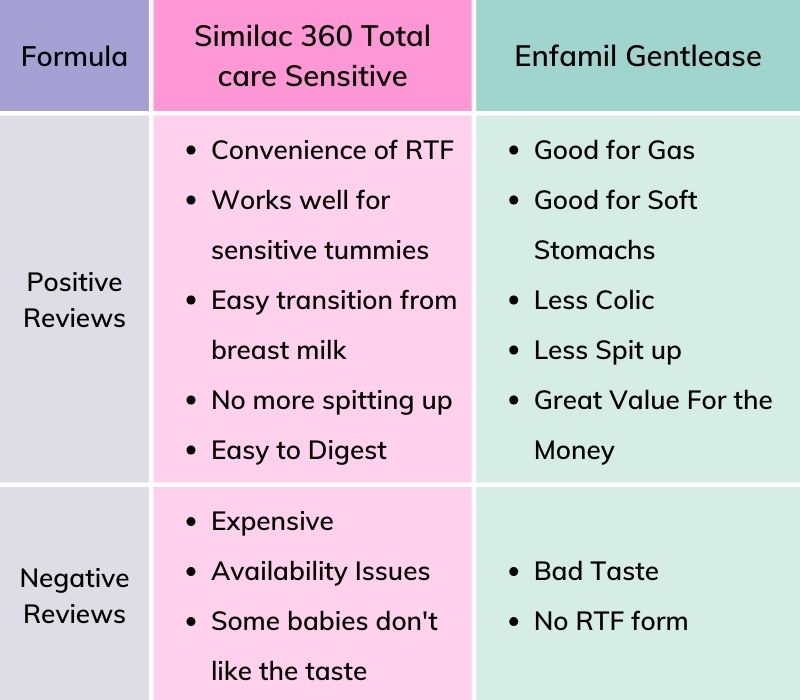
Similac 360 Total Care Sensitive:
Positive Reviews:
- Convenience of RTF (Ready-to-Feed): Many moms find the Ready-to-Feed formats (2-fl-oz and 8-fl-oz) of Similac 360 Total Care Sensitive extremely convenient, especially during nighttime feedings or when on the go.
- Works well for sensitive tummies: This formula is highly regarded for its effectiveness in addressing the needs of babies with sensitive stomachs. It’s known for reducing colic and excessive gassiness thanks to its 5 HMO prebiotics.
- Easy transition from breast milk: Mothers who have transitioned from breastfeeding to formula feeding appreciate that their babies seem to adapt well to Similac 360 Total Care Sensitive.
- No more spitting up: A significant number of moms report a reduction in their baby’s spitting-up issues, indicating improved digestive comfort.
- Easy to Digest: Babies consuming this formula tend to experience fewer digestive discomforts, which is reassuring for moms.
Negative Reviews:
- Expensive: Some parents find Similac 360 Total Care Sensitive to be on the pricier side, which can be a concern for those on a tight budget.
- Availability Issues: There have been reports of occasional availability issues, which can be frustrating for moms who rely on this formula.
- Some babies don’t like the taste: A few babies may not take to the taste of this formula, leading to feeding difficulties.
Enfamil Gentlease:
Positive Reviews:
- Good for Gas: Moms appreciate that Enfamil Gentlease is effective at reducing gassiness in their babies, contributing to overall comfort.
- Good for Soft Stomachs: It’s praised for its gentleness on baby’s tummies, making it an excellent choice for infants with sensitive digestive systems.
- Less Colic: Parents have reported a reduction in colic symptoms when using this formula, which can be a significant relief for both babies and moms.
- Less Spit-up: Many moms notice a decrease in the frequency of spit-up incidents, enhancing their baby’s feeding experience.
- Great Value For the Money: Enfamil Gentlease is seen as a good value, providing quality results at a reasonable price.
Negative Reviews:
- Bad Taste: Some babies might not prefer the taste of Enfamil Gentlease, leading to potential feeding challenges.
- No RTF Form: Unlike Similac 360 Total Care Sensitive, Enfamil Gentlease does not offer a Ready-to-Feed option, which can be less convenient for some parents.
Related: Similac Sensitive Vs. 360 Total Care Sensitive
Ingredients Comparison:
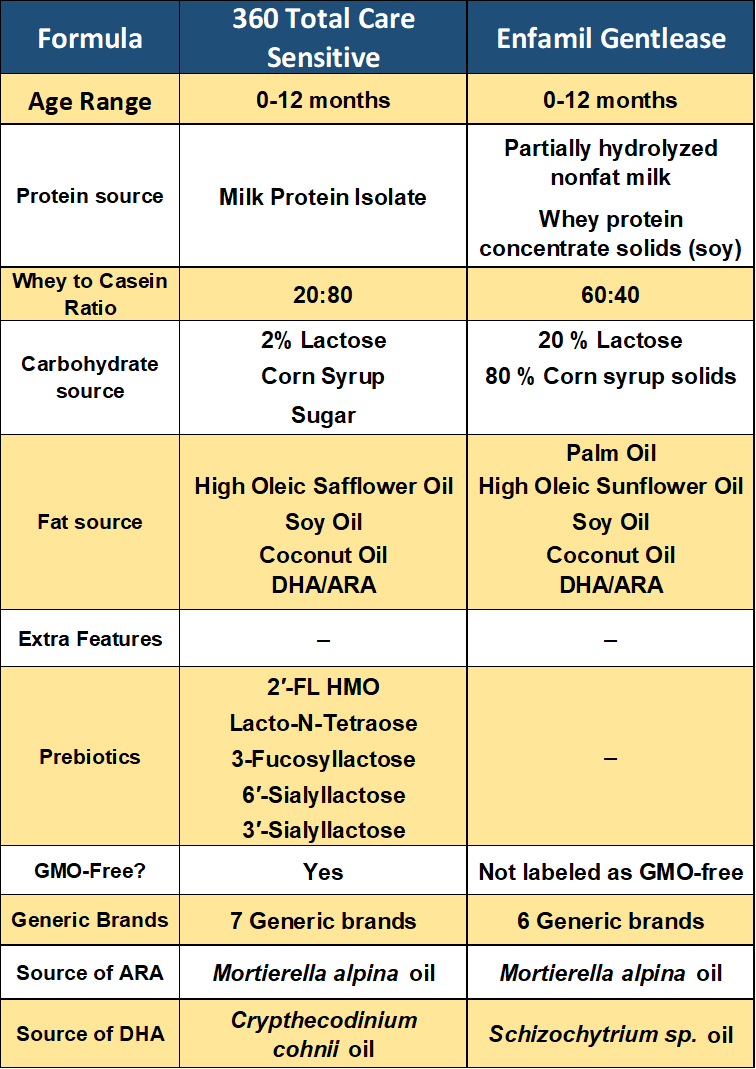
Age Range:
Both Similac 360 Total Care Sensitive and Enfamil Gentlease are formulated to cater to infants from birth up to 12 months of age, making them suitable choices for the entire first year of a baby’s life.
Protein Source:
- Similac 360 Total Care Sensitive: This formula relies on Milk Protein Isolate as its primary protein source. This source of protein, derived from milk, is known for its easy digestibility and is often a preferred choice for infants with sensitive stomachs.
- Enfamil Gentlease: In contrast, Enfamil Gentlease incorporates a combination of partially hydrolyzed nonfat milk and whey protein concentrate solids. This blend of proteins, along with a minor contribution from soy protein, is designed to be gentle on the baby’s delicate stomach, making it an ideal choice for infants with sensitivity to lactose because soy protein is lactose-free.
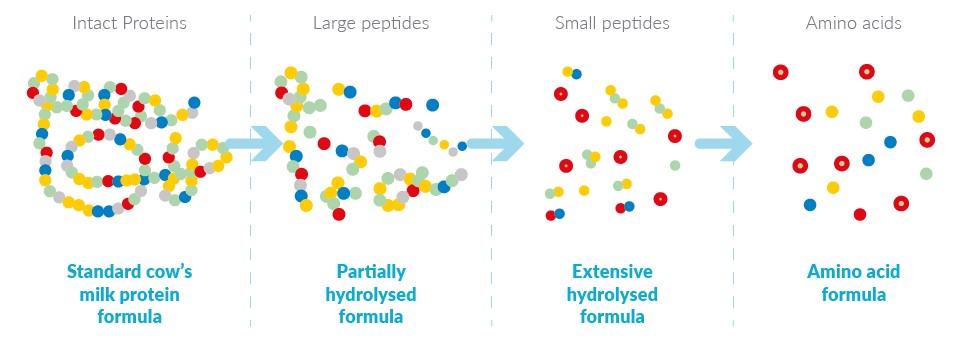
Whey to Casein Ratio:
- Similac 360 Total Care Sensitive: It has a whey-to-casein ratio of 20:80, indicating a higher proportion of casein. This ratio is designed to offer slower digestion and potentially help with issues like fussiness and gas.
- Enfamil Gentlease: With a more balanced whey-to-casein ratio of 60:40, Enfamil Gentlease provides a blend that’s closer to the natural proportion found in breast milk. This balance can be easier on a baby’s stomach, ensuring comfort during feeding.
Carbohydrate Source:
- Similac 360 Total Care Sensitive: This formula contains only 2% Lactose, a natural sugar found in milk, which makes it an excellent choice for infants with lactose sensitivity. The 98% of carbohydrate is replaced by corn syrup and sugar.
- Enfamil Gentlease: In contrast, Enfamil Gentlease contains a higher proportion of Lactose (20% of carbohydrate source) and utilizes Corn Syrup (80% Corn syrup solids) to provide the necessary energy for your baby. This can be a consideration for parents who prefer or need lower lactose content.
Related: Similac Total Comfort Vs. Enfamil Gentlease
Fat Source:
Both Similac 360 Total Care Sensitive and Enfamil Gentlease share similar fat sources, including High Oleic Safflower or sunflower Oil, Soy Oil, and Coconut Oil. However, Enfamil Gentlease includes Palm Oil in its composition, which may be a notable point for parents who are concerned about palm oil.
Also, Both formulas incorporate DHA (Docosahexaenoic Acid) and ARA (Arachidonic Acid), which are essential fatty acids for infant brain and eye development. These components play a crucial role in the overall cognitive and visual development of your baby.
Prebiotics:
- Similac 360 Total Care Sensitive: This formula contains various prebiotics, including 2′-FL HMO (2′-Fucosyllactose), Lacto-N-Tetraose, 3-Fucosyllactose, 6′-Sialyllactose, and 3′-Sialyllactose. These prebiotics contribute to the development of a healthy gut microbiome in infants, supporting their digestive health.
- Enfamil Gentlease: Doesn’t have a prebiotic.
« HMOs are special prebiotics found naturally in a mother’s breast milk. They are the most abundant solid ingredient in breast milk after fat and carbohydrates. In breastfed babies, HMOs are scientifically shown to positively affect the microbiome. » says nutritionnews.Abbott
GMO-Free:
- Similac 360 Total Care Sensitive: This formula is labeled as GMO-Free, assuring parents that it does not contain genetically modified organisms, which is important for those who prefer non-GMO products.
- Enfamil Gentlease: It is not explicitly labeled as GMO-Free.
Generic Brands:
- Similac 360 Total Care Sensitive: This formula is available from seven generic brands, offering parents a range of choices and potentially cost-effective alternatives.
- Enfamil Gentlease: It is offered by six generic brands, providing options for parents who prefer generic alternatives to the name-brand formula.
Source of ARA and DHA:
Both formulas source their ARA from Mortierella alpina oil, ensuring a consistent and reliable source of this essential fatty acid. However, they differ in their source of DHA, with 360 Total Care Sensitive using Crypthecodinium cohnii oil, and Enfamil Gentlease obtaining its DHA from Schizochytrium sp. oil. These sources are carefully selected to provide the necessary nutrients for your baby’s development.
Nutrients Comparison:
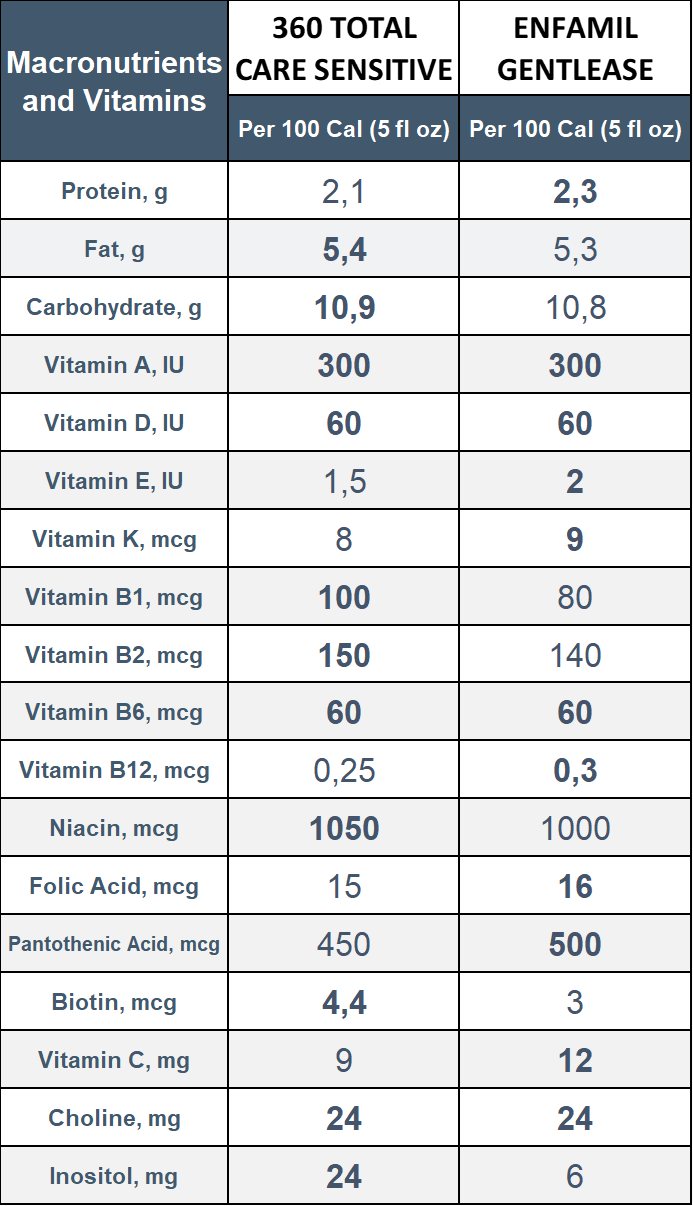
In terms of macronutrients and vitamins, both formulas offer a similar profile but there are some differences in levels, let’s see the key differences:
Macronutrients:
Protein:
Enfamil Gentlease Offers a slightly higher protein content at 2.3 grams per 100 calories than 360 Total Care Sensitive, which may be suitable for babies who require or prefer a bit more protein in their diet.
Fat:
Similac 360 Total Care Sensitive contains 5.4 grams of fat per 100 calories, providing a moderate fat content for baby’s growth and development while Enfamil Gentlease provides 5.3 grams per 100 calories.
Carbohydrate:
Similac 360 Total Care Sensitive: Contains 10.9 grams of carbohydrates per 100 calories a slightly higher carbohydrate content than Enfamil Gentlease which offers 10.8 grams of carbohydrates per 100 calories.
Vitamins:
In terms of vitamins Enfamil Gentlease has higher amounts of these vitamins:
Vitamin E: 2 IU per 100 calories. Vitamin E is an antioxidant vitamin that supports overall health and development.
Vitamin K: 9 mcg per 100 calories. Vitamin K is essential for blood clotting and bone health in infants.
Vitamin B12: 0.3 mcg per 100 calories. Vitamin B12 is essential for blood cell formation and neurological function in infants.
Folic Acid: 16 mcg per 100 calories. Folic Acid is crucial for cell division and overall growth.
Pantothenic Acid: 500 mcg per 100 Calories. Pantothenic Acid is important for energy metabolism and overall health.
Vitamin C: 12 mg per 100 calories. Vitamin C is an antioxidant vitamin that supports the immune system and overall health.
On the other hand, Similac 360 Total Care Sensitive has more:
Vitamin B1 (Thiamine): 100 mcg per 100 calories. Vitamin B1 plays a crucial role in energy metabolism and nerve function.
Vitamin B2 (Riboflavin): 150 mcg per 100 calories. Vitamin B2 is important for overall growth and development.
Niacin: 1050 mcg per 100 calories.
Biotin: 4.4 mcg per 100 calories.
Inositol: 24 mg per 100 calories. Inositol is important for cell signaling, nerve function, and lipid metabolism, and the varying levels may cater to specific dietary preferences. The average level in breast milk is 22 mg per 100 Cal.
Related: Enfamil Gentlease Vs Enfamil Neuropro Gentlease: What’s The Difference?
Minerals:
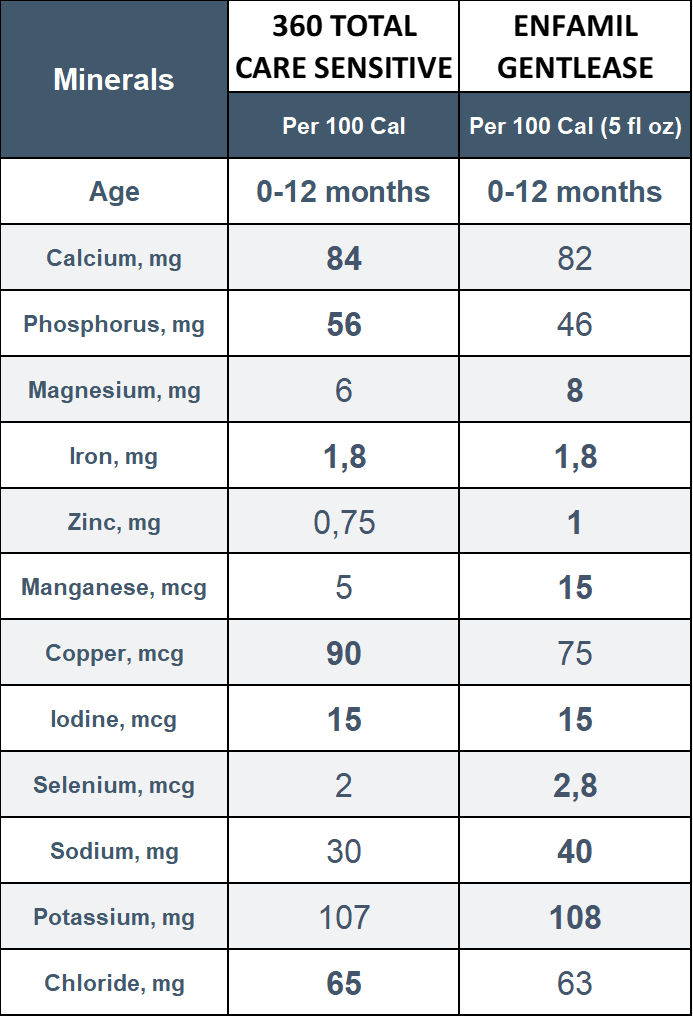
In terms of minerals, the key differences are:
Calcium: Similac 360 Total Care Sensitive provides a slightly higher amount of calcium, 84 mg per 100 calories, which is essential for healthy bone and teeth development in growing infants.
Phosphorus: Similac 360 Total Care Sensitive contains more phosphorus, 56 mg per 100 calories. Phosphorus plays a critical role in bone health and various physiological processes.
Magnesium: Gentlease contains slightly more, with 8 mg of magnesium per 100 calories. Magnesium is important for muscle and nerve function.
Zinc: Enfamil Gentlease offers more zinc, with 1 mg per 100 calories. Zinc is important for immune function and growth.
Manganese: Enfamil Gentlease contains a higher amount, with 15 mcg of manganese per 100 calories. Manganese plays a role in various enzymatic reactions in the body, and the difference may be of interest to parents with specific dietary preferences.
Copper: Similac 360 Total Care Sensitive contains 90 mcg of copper per 100 calories, while Enfamil Gentlease offers slightly less copper, with 75 mcg per 100 calories. Copper is essential for various metabolic processes.
Selenium: Enfamil Gentlease offers a slightly higher amount, with 2.8 mcg of selenium per 100 calories. Selenium is an essential antioxidant mineral.
Sodium: Gentlease contains slightly more, with 40 mg of sodium per 100 calories. Sodium is important for various physiological functions.
Potassium: Similac 360 Total Care Sensitive contains 107 mg of potassium per 100 calories, while Enfamil Gentlease offers 108 mg of potassium per 100 calories. Potassium is essential for nerve and muscle function, and the levels are quite similar between the two formulas.
Chloride: 360 Total Care Sensitive contains 65 mg of chloride per 100 calories, while Enfamil Gentlease offers slightly less chloride, with 63 mg per 100 calories. Chloride is involved in maintaining fluid balance in the body.
Price Comparison:
| Similac 360 Total Care Sensitive | Enfamil Gentlease |
|---|---|
| – | 12.4 oz $21.52 $1.74/oz Buy 12.4 oz |
| 20.1 oz $35.18 1.75 /oz Buy 20.1 oz | 19.9 oz $32.86 $1.65/oz Buy 19.9 oz |
| 30.2 oz $47.98 1.59 /oz Buy 30.2 oz | 27.7 oz $44.96 $1.62/oz Buy 27.7 oz |
| 2-fl-oz $1.25 62.41 ¢/fl oz Buy 2 fl oz | – |
| 8-fl-oz $2.78 34.74 ¢/fl oz Buy 8 fl oz | – |
| 32-fl-oz $10.92 34.12 ¢/fl oz Buy 32 fl oz | – |
| 4.8 of 5.0 590 reviews | 4.8 of 5.0 7096 reviews |
Price:
In terms of cost, Enfamil Gentlease generally proves to be the more economical option for small sizes (12.4 oz and 19.9 oz) whereas Similac 360 Total Care Sensitive is cost-effective in large sizes (30.2 oz).
Rating:
Both formulas have received commendable user ratings. Enfamil Gentlease boasts a rating of 4.8 out of 5.0, based on a substantial number of reviews (7096 to be precise). Similac 360 Total Care Sensitive also enjoys a rating of 4.8 out of 5.0, with fewer reviews, but still a significant 590 in total.
Ready-to-feed:
One notable difference is in the ready-to-feed options. Enfamil Gentlease does not offer a ready-to-feed version, while Similac 360 Total Care Sensitive provides 3 ready-to-feed options, 2-fl-oz, 8-fl-oz, and 32-fl-oz, which makes it convenient for parents who want a hassle-free and quick feeding solution, especially when on the go.
Can You Mix Enfamil Gentlease and 360 Total Care Sensitive?
While it’s generally not recommended to mix different infant formulas, there might be specific situations where it’s considered acceptable, although it’s always advisable to consult with a healthcare professional, like a pediatrician, before doing so. Here are some cases where mixing Similac 360 Total Care Sensitive and Enfamil Gentlease could be considered:
- Pediatrician’s Recommendation: If your pediatrician suggests a specific mixing ratio or combination due to your baby’s unique dietary needs, you should follow their guidance closely.
- Gradual Transition: When transitioning from one formula to another, a gradual approach may be recommended. In this case, you might mix the two formulas in varying proportions over a period of time as part of a controlled transition, following your healthcare provider’s advice.
- Temporary Situations: In certain situations, like travel or emergencies, where you may not have access to your preferred formula, you could mix the two temporarily, but try to return to your baby’s original formula as soon as possible.
How to Switch Between Enfamil Gentlease and 360 Total Care Sensitive?
Switching between infant formulas, such as Similac 360 Total Care Sensitive and Enfamil Gentlease is better to be done gradually and with guidance from your pediatrician. Here are the steps to consider when making the transition:
- Consult Your Pediatrician: Before making any changes to your baby’s diet, consult your pediatrician. They can provide personalized advice and guidance based on your baby’s specific needs.
- Select the New Formula: Discuss with your pediatrician the reasons for switching and choose the new formula, whether it’s from Similac 360 Total Care Sensitive to Enfamil Gentlease or vice versa.
- Gradual Transition: It’s generally recommended to transition slowly over the course of several days or even a week. Sudden changes can lead to digestive discomfort.
- Start with a Mix: Begin by mixing the old and new formulas. For example, on the first day, you might use 25% of the new formula and 75% of the old formula. Gradually increase the proportion of the new formula each day.
- Monitor Your Baby: Pay close attention to your baby’s response to the new formula. Look for signs of digestive discomfort, allergies, or any adverse reactions. If you notice any concerning symptoms, contact your pediatrician immediately.
- Complete the Transition: Continue increasing the proportion of the new formula until your baby is fully switched over. This process should be guided by your pediatrician’s recommendations.
- Storage and Preparation: Ensure that you store and prepare the new formula according to the manufacturer’s instructions.
- Stay Hydrated: During the transition, keep your baby well-hydrated with breast milk or the appropriate infant formula.
Remember that every baby is unique, and their response to a formula switch can vary. Some babies may adjust seamlessly, while others may need more time and support.
Resources:
https://hcp.meadjohnson.com/s/product/a4R4J000000PpQMUA0/enfamil-gentlease
